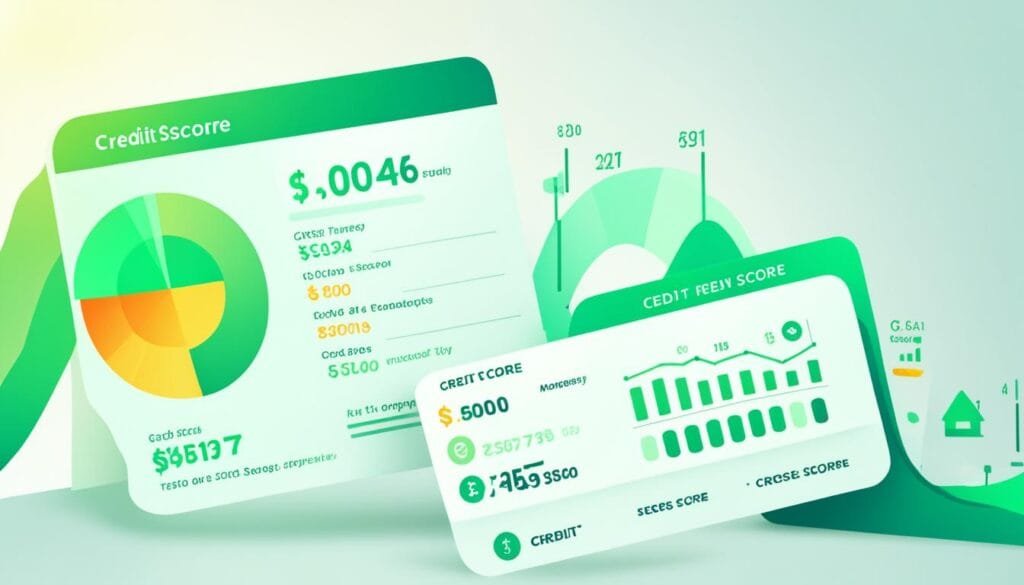Building and maintaining a good credit score is essential for your financial well-being. A high credit score opens doors to better loan options, lower interest rates, and favorable financial opportunities. But how can you improve your credit score and take control of your financial future?
Let me share a story that many of us can relate to:
Lisa, a hardworking young professional, had dreams of buying her first home. She knew that achieving a good credit score was the key to unlock favorable mortgage rates. However, she faced a few roadblocks. Her credit history wasn’t strong enough, and she had some overdue bills that were affecting her score.
Determined to improve her credit score, Lisa embarked on a journey to discover the most effective credit score boosting techniques. She educated herself on credit repair, credit building, credit monitoring, and debt management. Armed with this knowledge, she implemented a strategic plan to improve her creditworthiness.
Lisa started by making on-time payments for all her bills, ensuring that no payments were missed. She realized that payment history played a significant role in determining her credit score. By being consistent with her payments, she was able to demonstrate financial responsibility and improve her creditworthiness over time.
She also learned the importance of credit utilization. Lisa made a conscious effort to keep her credit utilization ratio low by paying off her credit card balances in full each month. By doing so, she showed potential creditors that she was responsible and could manage her debts effectively.
In addition to these techniques, Lisa explored credit building options such as credit builder loans and secured credit cards. She discovered that by responsibly utilizing these resources, she could establish a positive credit history and increase her credit score.
Monitoring her credit report became a regular habit for Lisa. She checked for any errors or discrepancies that could negatively impact her score. Whenever she spotted an inaccuracy, she promptly disputed it with the credit bureaus to ensure the accuracy of her credit report.
Over time, Lisa saw her credit score steadily rise. Her diligent efforts paid off, and she finally achieved the credit score she desired. With her improved creditworthiness, she successfully secured a mortgage for her dream home at a favorable interest rate.
Are you ready to take control of your credit score and pave the way to a better financial future, just like Lisa did?
Key Takeaways:
- Pay your bills on time to establish a positive payment history.
- Keep your credit utilization ratio low by paying off credit card balances in full.
- Consider credit building options such as credit builder loans and secured credit cards.
- Regularly monitor your credit report for errors and dispute any inaccuracies.
- Improve your credit score gradually by implementing these proven techniques.
Understanding the Factors that Influence Your Credit Score
Your credit score is influenced by several key factors that can have a significant impact on your financial health. It is crucial to understand these factors and how they contribute to your overall creditworthiness. By focusing on these credit score factors and implementing the right strategies, you can effectively improve your credit score and open doors to better financial opportunities.
Payment History
One of the most important factors in determining your credit score is your payment history. It accounts for about 35% of your score and reflects your track record of making on-time payments to creditors. Consistently paying your bills and debts on time demonstrates responsible financial behavior and helps build a positive credit history.
Credit Utilization Ratio
The credit utilization ratio is the amount of credit you are using compared to your available credit limit. It comprises approximately 30% of your credit score. Keeping your credit utilization ratio low, ideally below 30%, shows that you are effectively managing your credit and not relying too heavily on borrowed funds.
Length of Credit History
The length of your credit history contributes around 15% to your credit score. It considers the age of your oldest and newest accounts, the average age of all your accounts, and the length of time since specific account activity. Generally, a longer credit history reflects a more established credit profile, which can positively impact your credit score.
Credit Mix
The variety of credit types you have in your credit history, such as credit cards, loans, and mortgages, makes up about 10% of your credit score. Having a mix of different types of credit can demonstrate your ability to manage various financial obligations responsibly.
New Credit Applications
Applying for new credit can impact your credit score, contributing around 10% to the overall calculation. When you apply for new credit, it indicates that you may be taking on additional debt. Multiple credit applications within a short period can negatively affect your credit score. It is essential to apply for new credit sparingly and only when necessary.
Understanding these credit score factors provides insight into how lenders evaluate your creditworthiness. By focusing on maintaining a strong payment history, keeping your credit utilization ratio low, having a mix of credit types, and being cautious when applying for new credit, you can work towards improving your credit score over time.
Techniques to Improve Payment History and Credit Utilization
Building a positive payment history and managing credit utilization are crucial steps in improving your credit score. By implementing the following techniques, you can demonstrate responsible credit management and boost your overall creditworthiness.
Making On-Time Payments
One of the most important strategies for improving your payment history is consistently making on-time payments. Late payments can have a significant negative impact on your credit score, so it’s essential to prioritize timely payments on all of your credit accounts.
Paying Before Statement Closing Date
To minimize your credit utilization ratio, consider paying your credit card balance before the statement closing date. By paying early, you can reduce the balance that’s reported to the credit bureaus, which can positively affect your credit score.
Splitting Payments Twice a Month
Another effective technique to manage credit utilization is to split your monthly payments into two. By making two smaller payments throughout the month, you can keep your credit card balances lower and maintain a lower credit utilization ratio on a continuous basis.
Including Rental Payments, Cell Phone, and Utility Bills
Did you know that you can add rental payments, cell phone bills, and utility bills to your credit report? By opting for reporting services such as Experian Boost, you can include these payments in your credit history and potentially improve your credit score. This is particularly beneficial if you have limited credit history or are working on rebuilding your credit.
Adding Monthly Subscription Payments
Similar to rental payments and utility bills, you can also include your monthly subscription payments, such as streaming services or gym memberships, in your credit report. By demonstrating a positive payment history on these recurring expenses, you can showcase responsible credit management and boost your overall creditworthiness.
Implementing these techniques can significantly improve your payment history and credit utilization, which are key factors in determining your credit score. By showcasing your ability to make on-time payments and manage credit responsibly, you can work towards achieving a higher credit score and better financial opportunities.
Building Credit with Loans and Secured Credit Cards
If you’re looking to boost your credit score and improve your financial standing, there are several strategies you can employ. One effective approach is to consider a credit builder loan or a secured credit card. These options allow you to demonstrate responsible credit behavior and can have a positive impact on your credit score.
A credit builder loan is specifically designed for individuals with limited credit history or poor credit. With this type of loan, you borrow a small amount of money, typically held in a savings account or a certificate of deposit. As you make regular payments on the loan, your positive payment history is reported to the credit bureaus, helping to establish or rebuild your credit.
A secured credit card requires you to make a cash deposit as collateral, which establishes your credit limit. By using the card responsibly and making timely payments, you can demonstrate your creditworthiness to lenders. Additionally, secured credit cards may offer more lenient approval requirements compared to traditional credit cards, making them a great option for those with less-than-perfect credit.

Another valuable tool in improving your credit score is UltraFICO. Unlike traditional credit scoring models, UltraFICO takes into account your bank account data and financial management habits. If you have limited credit history, this tool can be especially useful in increasing your credit score by providing additional information to lenders.
To further enhance your credit score, consider implementing debt payoff strategies. Two popular methods are the snowball method and the avalanche method. With the snowball method, you focus on paying off your smallest debts first while making minimum payments on larger debts. The avalanche method, on the other hand, prioritizes higher-interest debts, helping you save on interest payments over time. Whichever approach you choose, committing to and sticking with a debt payoff strategy can have a significant impact on your credit score and overall financial well-being.
Credit Report Monitoring and Error Rectification
Regularly monitoring your credit report is essential for maintaining financial health and ensuring the accuracy of your credit information. By regularly reviewing your credit report, you can identify errors and potential instances of fraud, allowing you to take prompt action to rectify these issues and protect your creditworthiness.
Credit report monitoring gives you the opportunity to track your credit activity, spot any discrepancies, and take the necessary steps to resolve them. This proactive approach enables you to stay on top of your credit information and maintain a healthy credit profile.
Should you identify any inaccuracies in your credit report, it is crucial to dispute errors promptly. Contact the credit bureaus in writing to notify them of the discrepancies and provide supporting documents as evidence. The credit bureaus are required to investigate your dispute and make any necessary corrections.
In some cases, you may need to expedite the process to quickly update your credit information. This is where rapid rescoring comes into play. Typically used by mortgage lenders, rapid rescoring allows for the speedy update of your credit history within days. By leveraging this technique, you can potentially boost your credit score in a short period, improving your chances of securing favorable financing terms.
Another strategy that can positively impact your credit score is becoming an authorized user on someone else’s credit account. When you are added as an authorized user to a credit card with a positive payment history and low credit utilization, this information can be reported on your credit report. As a result, your credit score may receive a substantial lift as you benefit from the positive credit history associated with the account.
By utilizing credit report monitoring, disputing errors, exploring rapid rescoring, and leveraging authorized user status, you can actively manage your credit information, correct inaccuracies, and potentially boost your credit score.

Tips for Optimal Credit Management and Credit Limit Increases
When it comes to managing your credit, there are several key strategies that can help boost your credit score and improve your financial standing. By implementing these tips, you can optimize your credit management and increase your credit limit, paving the way for a healthier credit profile.
Maintain a Low Credit Utilization
One of the most important factors in determining your credit score is your credit utilization ratio. It refers to the amount of credit you are currently using compared to your total available credit limit. To keep credit utilization low and maximize your credit score, strive to keep your balances below 30% of your credit limits across all accounts. This demonstrates responsible credit management and shows lenders that you are using credit responsibly.
Optimize Your Credit Mix
Having a diverse mix of credit types in your credit portfolio can also positively impact your credit score. Optimize your credit mix by managing a combination of installment loans and credit cards. This shows lenders that you can handle different types of debts responsibly. For example, having a car loan, a student loan, and a credit card can demonstrate your ability to manage different forms of credit effectively.
Negotiate Account Adjustments
If you find yourself struggling to make payments on certain accounts or facing financial difficulties, consider negotiating account adjustments with your creditors. This could include temporary payment arrangements, interest rate reductions, or debt consolidation options. By proactively seeking solutions with your creditors, you can avoid negative entries on your credit report and maintain a healthy credit profile.
Maximize Credit Limit Increases
Regularly review your credit accounts and take advantage of any opportunities to request credit limit increases. A higher credit limit not only gives you more purchasing power but also improves your credit utilization ratio, assuming you maintain low balances. Before requesting a credit limit increase, make sure you have a positive payment history and have demonstrated responsible credit management.
By implementing these tips for optimal credit management and credit limit increases, you can take control of your financial health and improve your credit score. Remember to maintain a low credit utilization ratio, optimize your credit mix, negotiate account adjustments when needed, and maximize opportunities for credit limit increases.
How Do Credit Repair Services Help Boost Your Credit Score?
Credit repair services can be incredibly helpful in improving your credit score. By using professional boost your credit score services, you can identify errors on your report, negotiate with creditors, and develop a strategic plan to boost your credit score. These services aim to increase your creditworthiness and financial opportunities.
Conclusion
Boosting your credit score is essential for improving your financial health and opening up new opportunities. By implementing the credit score boosting techniques discussed in this article, you can take control of your financial future and achieve the financial freedom you desire. Managing your payment history and credit utilization, building credit with loans and secured credit cards, and monitoring your credit report are all effective strategies for improving your credit score.
Remember to regularly monitor your credit report to identify any errors or inaccuracies that may be negatively impacting your credit score. By promptly disputing these errors, you can ensure the accuracy of your credit report and prevent any potential fraud. Rapid rescoring, if applicable, can be used to update your credit information quickly, potentially giving your credit score a significant boost in a short period of time.
Optimizing your credit management and credit utilization are crucial for maintaining a healthy credit score. Keep your credit utilization ratio low by managing your balances in proportion to your credit limits. Strive to maintain a diverse credit mix, including both installment loans and credit cards, to demonstrate responsible handling of various types of debts. Additionally, consider negotiating account adjustments with creditors and taking advantage of credit limit increase opportunities to further improve your credit score.
By following these credit score boosting techniques and taking charge of your financial journey, you can enhance your financial health, seize new opportunities, and attain the ultimate goal of financial freedom.
FAQ
What are the top credit score boosting techniques?
The top credit score boosting techniques include credit repair, credit building, credit monitoring, debt management, and more. These strategies can help improve your financial standing and access better loan options and favorable interest rates.
What factors influence my credit score?
Several key factors influence your credit score, including payment history, credit utilization ratio, length of credit history, credit mix, and new credit applications. Each factor carries a different weight in determining your score.
How can I improve my payment history and credit utilization?
You can improve your payment history by making on-time payments and diversifying your credit report to include rental payments, cell phone and utility bills, and monthly subscription payments. To improve your credit utilization, consider paying before your statement closing date or splitting payments throughout the month.
What options are available for building credit?
To build credit, you can consider options such as a credit builder loan or a secured credit card. These tools allow you to demonstrate responsible credit behavior and can have a positive impact on your credit score. Additionally, UltraFICO uses your bank account data to potentially increase your credit score if you have limited credit history.
How can I monitor and rectify errors in my credit report?
Regularly monitoring your credit report is essential for identifying errors and potential fraud. If you spot any inaccuracies, promptly dispute them with credit bureaus to ensure accuracy. Rapid rescoring is a technique used by mortgage lenders to quickly update credit information and potentially boost your score within days.
What tips can help with credit management and credit limit increases?
To optimize credit management, maintain a low credit utilization ratio, ideally below 30%. Keep balances low in proportion to your credit limits across all accounts. Managing a diverse portfolio of credit types, negotiating account adjustments with creditors, and taking advantage of credit limit increase opportunities can all positively impact your credit score.
How do credit score boosting techniques improve financial health?
Implementing credit score boosting techniques can improve your financial health by enabling you to gain access to better opportunities. These techniques can help you secure loans with more favorable terms and lower interest rates, providing you with greater financial freedom.
Source Links
- https://www.linkedin.com/pulse/unveiling-20-hidden-strategies-skyrocket-your-credit-score-effinger-jiyuc?trk=article-ssr-frontend-pulse_more-articles_related-content-card
- https://www.consumerreports.org/credit-scores-reports/new-ways-to-improve-your-credit-score/
- https://www.iwillteachyoutoberich.com/how-to-improve-your-credit-score/

